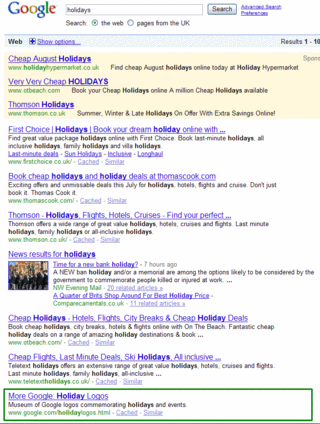So far in this series I've talked about how search demand for a brand might impact on its rankings, and about TrustRank, a link analysis algorithm that seems to be at least partially responsible for the changes in rankings we've seen since Vince, or "the brand update". TrustRank itself is part of the wider concept of "domain authority" that I'm going to discuss today.
What is Domain Authority?
Domain authority is a metric that measures how powerful your domain as a whole is. The idea is that, irrespective of how strong an individual page may be based on it's own PageRank or keyword relevancy, it will have a greater or lesser chance to rank from the outset based on the domain that it's hosted on. If you like, domain authority is the foundation on which other metrics used to score a page, such as PageRank, are built.
We all know traditional PageRank is a page level metric, but what happens when you ignore the individual pages within a site and simply focus on which sites link to which other sites? Then you have a good measure of domain authority.
Domain authority isn't new. "Black hat" SEOs have been taking advantage of it for as long as I can remember to rank for adult, pharmaceutical or gambling related search terms using parasite hosting (identifying an authorative domain and illicitly using it to host content designed to sell Viagra, for example). What is new is the increased importance that Google places on domain authority as part of the Vince brand update.
TrustRank fits in to this model because it measures sites in terms of how far they are away from the manually identified sources of trust, rather than individual pages.
"Holidays"
At the time of writing some readers you can see a perfect example of domain authority at work in Googles SERPs for the term "holidays" which I've captured in the image to the right (click for a larger image). Ranking in position 6 is none other than Google, with its page about its holiday logos.

Now, "holidays" isn't ultra competitive like "car insurance" but it certainly isn't the type of query that you'd ordinarily expect odd sites to pop up for. Before Vince it was definately a query you had to work pretty hard at if you wanted to be on page 1 of Google. So what explains this holiday logos page appearing?
It's not on-page SEO. Sure, the page contains the word "holidays" (once) and "holiday" a few times too, but it's not especially optimised for the term.
The other major traditional signal we expect Google to be looking at is anchor text. Let's compare the anchor text of the holiday logos page with the pages ranking either side of it in positions 5 and 7; Teletext Holidays and Travelsupermarket's holidays page. I've looked at two statistics, exact and phrase match, which respectively measure the number of links using "holidays" as the exact anchor text and the number including "holidays" as part of a longer phrase.
|
Page |
Ranking |
Exact Match |
Phrase Match |
|
Travelsupermarket Holidays |
7 |
391 |
1,086 |
|
Teletext Holidays |
5 |
2 |
745 |
|
Google Holiday Logos |
6 |
0 |
25 |
Rather conclusively, and as you might expect, anchor text isn't the cause of Google's ranking for "holidays" either. That leaves domain authority and, let's face it, few domains are as authorative as www.google.com.
Wikipedia
If you spend some time analysing what sites rank well in natural search, in most keyword spaces there will typically be one site that crops up with remarkable consistency; Wikipedia. Why Wikipedia ranks so well for almost every topic it covers is an interesting topic worthy of a blog post in its own right, but suffice to say for now that its domain authority is immense. When a new Wikipedia page is created you can generally put money on it ranking on page one of the major search engines based purely on the fact that it sits on wikipedia.org.
In the fourth and final instalment of this series we'll look at what this all means for your site and what you can do to make sure you benefit from the increased importance of domain authority and the other elements that make up the brand update.
Brand Update Posts
Part 2 - Could Search Behaviour Determine Rankings?
Part 3 - Domain Authority


